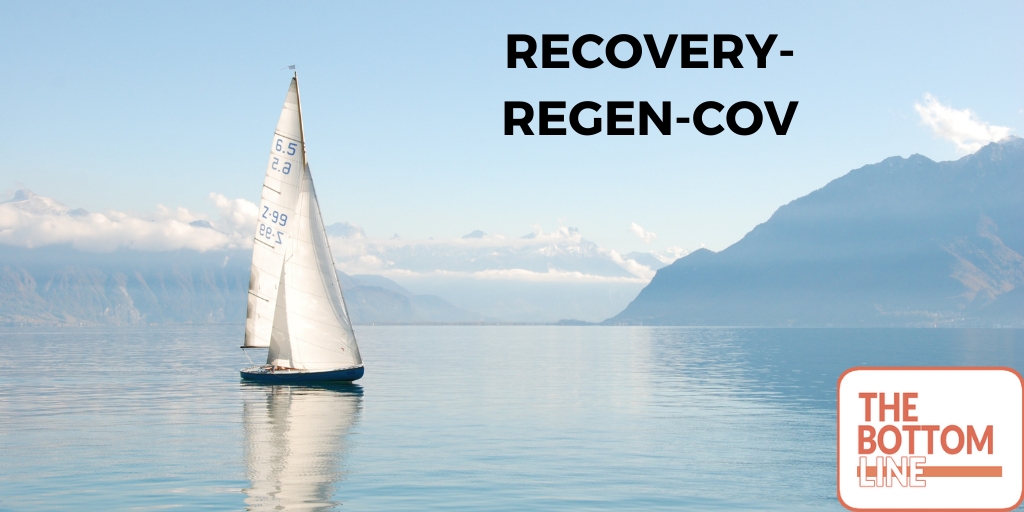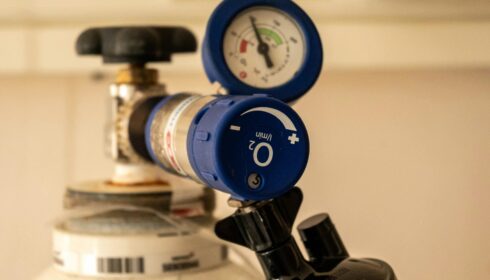RECOVERY REGEN-COV

Casirivimab and imdevimab in patients admitted to hospital with COVID-19 (RECOVERY): a randomised, controlled, open-label, platform trial
@PeterHorby. medRxiv pre-print 2021 doi: https://doi.org/10.1101/2021.06.15.21258542
Clinical Question
- In hospitalised patients with COVID-19, does the addition of monoclonal antibodies REGEN-COV (carsirivimab & imdevimab) to standard care, compared with standard care alone, improve 28 day mortality?
Background
- Monoclonal antibodies have been shown to be effective for prophylaxis and treatment of selected viral disease. The mechanism of action is thought to be direct binding to free virus particles leading to their neutralisation. They may also stimulate antibody-dependent phagocystosis and cytotoxicity
- SARS-CoV-2 infection is initiated by binding of the viral transmembrane spike glycoprotein to angiotensin converting enzyme 2 (ACE2) on the cell surface
- Casirivimab and imdevimab and non-competitive monoclonal antibodies that bind to the receptor binding domain of the spike glycoprotein, blocking viral entry into host cells. The use of two antibodies that bind to non-overlapping epitopes was used to try and minimise risk of resistance
- A randomised controlled study in over 4000 outpatients with COVID-19, reported that the use of REGEN-COV significantly reduced Covid-19-related hospitalisation or all-cause death
- In December 2020 an interim analysis of a small RCT reports benefit with the use of REGEN-COV in hospitalised patients who are on low flow oxygen and are sero-negative at baseline. At time of analysis there were 217 sero-negative patients and 270 sero-positive patient included. From October 2020 the trial stopped recruiting patients who were requiring high-flow oxygen or mechanical ventilation at baseline, following a recommendation by the Independent Data Monitoring Committee. These results have not yet been published
- The RECOVERY trial continued to investigate the use of REGEN-COV in all hospitalised patients with COVID-19, regardless of severity
Design
- Randomised controlled open-label platform trial
- Web-based simple (unstratified) randomisation
- 1:1:1 to either standard care, usual standard care plus REGEN-COVID or usual standard care + convalescent plasma (until 15th Jan 20201). Convalescent plasma study published separately
- Allocation concealed until after randomisation
- Baseline antibodies tested at time of randomisation
- Predefined assay threshold with a ≥99% sensitivity and specificity in detecting individuals with SARS-CoV-2 infection at least 20 days previously
- Patients could be simultaneously randomised to other treatment groups
- Azithromycin vs usual care
- Colchicine vs usual care
- Aspirin vs usual care
- Baricitinib vs usual care
- Tocilizumab vs usual care – until 24/1/21 the trial also allowed this subsequent randomisation for patients with progressive COVID-19
- Intention to treat analysis
- Participants and local study staff were not masked to allocated treatment
- Registered on clinical trials.gov
- Regeneron Pharmaceuticals supplied REGEN-COV and provided comments on the manuscript for consideration
Setting
- 127 UK hospitals took part in the evaluation of REGEN-COV
- Data collected September 2020 – May 2021
Population
- Inclusion: Clinically suspected or laboratory confirmed SARS-CoV-2-infection
- Exclusion:
- Medical history that might in the opinion of attending clinician put the patient at significant risk
- Received IV immunoglobulin treatment during current admission
- Children <40kg or age <12 years
- 9785 patients randomised
- Comparing baseline characteristics of intervention vs. control group
- Sero-negative patients
- Age: 63 vs 64
- Male: 61% vs 58%
- Ethnicity – white: 81% vs 82%
- Number of days since symptom onset: 7 vs 7
- Number of days since admission to hospital: 1 vs 1
- Respiratory support received
- No oxygen: 11% vs 7%
- Simple oxygen: 66% vs 65%
- Non-invasive ventilation: 20% vs 22%
- Invasive ventilation: 2% vs 2%
- Co-morbidities
- Diabetes: 25% vs 27%
- Heart disease: 25% v 26%
- Chronic lung disease: 28% vs 30%
- Positive SARS-CoV 2 PCR test result : 97% vs 97%
- Additional treatments given
- Corticosteroids received: 91% vs 92%
- Tocilizumab or sarilumab: 13% vs 17%
- Remdesivir: 26% vs 28%
- Sero-negative patients
Intervention
- REGEN-COV + usual care
- Single dose of combination of 2 monoclonal antibodies (carsirivimab 4g & imdevimab 4g) by IV infusion in 250ml normal saline over 60 minutes
- 90% of patients received allocated treatment
Control
- Usual care
- <1% received REGEN-COV
Outcome
- Primary outcome: 28 day mortality
- Assessed 1st among patient without detectable antibodies to SARS-CoV-2 at randomisation
- Significantly reduced in REGEN-COV group
- 24% vs 30% (rate ratio 0.8; 95% CI 0.70-0.91, p=0.01)
- Fragility index – 37 patients
- NNT 19
- Significantly reduced in REGEN-COV group
- Subsequently tested in whole population (patient with and without detectable antibodies to SARS-CoV-2)
- No significant difference
- 20% vs 21%, (RR 0.94; 95% CI 0.86-1.03, p=0.17)
- No significant difference
- Assessed 1st among patient without detectable antibodies to SARS-CoV-2 at randomisation
- Secondary outcomes: Comparing REGEN-COV vs control
- In seronegative patients
- Progression to non-invasive ventilation or invasive ventilation – significantly reduced
- 28% vs 32%; RR 0.87 (0.77-0.98)
- Progression to invasive ventilation – no significant difference
- 12% vs 13%; RR 0.88 (0.73-1.06)
- Discharged alive from hospital within 28 day – significantly greater
- 64% vs 58%; Rate ratio 1.19 (1.06-1.30)
- Progression to non-invasive ventilation or invasive ventilation – significantly reduced
- In whole population – no significant differences
- Progression to non-invasive ventilation or invasive ventilation
- 23% vs 24%
- Discharged alive from hospital within 28 days
- 70% vs 69%
- Progression to non-invasive ventilation or invasive ventilation
- 72 hour safety outcomes in all patients
- Thrombotic event: 2% vs 1%
- Sudden hypotension: 4% vs 2%
- Sudden worsening in respiratory status: 21% vs 22%
- Clinical haemolysis: 1% vs 2%
- 7 suspected serious adverse reaction. Unclear if 5 or all 7 occurred in REGEN-COV group
- Allergic reaction: 3
- Seizure: 2
- Acute desaturation: 1
- Transient loss of consciousness: 1
Authors’ Conclusions
- In patients hospitalised with COVID-19, the monoclonal antibody combination of casirivimab and imdevimab reduced 28-day mortality among patients who were seronegative at baseline
Strengths
- Randomised controlled trial
- Large sample size
- Multi-centre
- Intention to treat analysis
- Minimal loss to follow up
- High fragility index
Weaknesses
- Non-blinding of treating clinicians and patients
- Low number of patients received tocilizumab which is now standard of care. This is following publication of another arm of this platform trial which demonstrated a mortality benefit with tocilizumab. Although this was not a weakness of the trial design, we do not know what impact REGEN-COV would have had if all patients had received tocilizumab
- Industry sponsor provided comments on the manuscript for consideration
The Bottom Line
- In hospitalised patients with COVID-19, the use of the REGEN-COV monoclonal antibody cocktail significantly reduced 28 day mortality in patients who did not have antibodies to COVID-19 at baseline
- The study population were largely not critically unwell, and had usually been treated with steroids but not tocilizumab. The mortality benefit may be different in different populations. However, as this is the best available evidence when REGEN-COV is available, I will use it on sero-negative critically ill patients who will have normally received both steroids and tocilizumab
External Links
- [article] Casirivimab and imdevimab in patients admitted to hospital with COVID-19 (RECOVERY): a randomised, controlled, open-label, platform trial
- [further reading] read
- [further reading] MRHA approval
- note MRHA dose much less
Metadata
Summary author: @davidslessor
Summary date: 2nd September 2021
Peer-review editor: Fraser Magee



